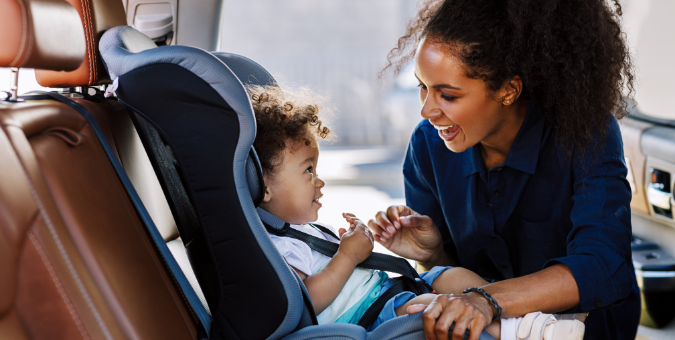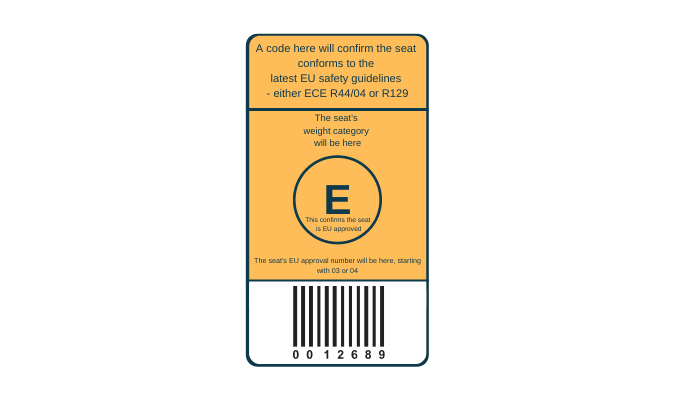
Our children are precious to us and naturally, that means we want to do everything we can to make sure they are safe.
When taking them on car journeys, that means having the right car seat to keep them safe and sound, even if the worst should happen.
When fitting a child seat, you need to make sure:
- you read the instructions carefully
- the seat is correct for the child’s weight and age
- the child seat is fitted tightly and not loose
The most common dangerous mistakes include:
- the harness straps are twisted or loose
- the harness clip is too low
- the child is bundled up in the seat
- the seat is too low
- the child has been put facing forward too soon
If the car seat is not fitted properly then there will be no benefit and no protection for the child should one have to brake sharply or be involved in an accident. The child could come loose or be thrown out of the seat by the force of impact.
Why do we need child car seats?
Child seats are designed for the safety of children. An adult seatbelt cannot be used on a child as it can result in injury to the child’s neck and abdomen.
Did you know that until babies are about 6 months old they breathe from the bottom of their lungs and being left for too long in a baby carrier can make it hard to breathe? The trouble with child car seats | Child Accident Prevention Trust (capt.org.uk)
Among the common explanations given as to why a child seat is not used are the following:
- it is only a short journey
- I don’t know how to fit the seat
- I assume the child can use an adult seatbelt with a booster seat
- Only one parent is able to fit the car seat
- Car seats are a money spinner
Switching baby seats between cars can cause problems if you don’t know how to fit the seat. Baby seats are used all the time in cars and as most families have two cars it is likely you will want to switch the baby seat. You need to make sure that everyone involved in transporting the baby in their car is fully able to fit the baby seat properly.
Car seats – what you need to know
What does the law say about car seats?
A child must normally use a child car seat until the age of 12 years, or until they are 135 centimetres tall. This includes child car seats and booster seats.
Children over the age of 12 years or 135 centimetres tall must wear a seat belt.
That all seems quite easy however, there are rules about a child’s weight especially in the early years and for babies up to the age of 15 months. You can either choose a seat depending on the child’s weight or height.
Car seats must meet certain safety requirements and you should see the below label on the car seat.

Height based car seats
Up to the age of 15 months this type of seat must be rear facing. Once the child is 15 months then a forward-facing seat should be used.
When using baby seats it is important that the seat is fitting correctly in the car you intend to use and any other vehicles you, your spouse or grandparents will use.
Weight based car seats
The seat you use will depend on the weight of your child and the way the child must be restrained in it.
There are a number of groups depending on the weight of the child:
0kg to 10kg Lie-flat or ‘lateral’ baby carrier, rear-facing baby carrier, or rear-facing baby seat using a harness
0kg to 13kg Rear-facing baby carrier or rear-facing baby seat using a harness
9kg to 18kg Rear or forward-facing baby seat using a harness or safety shield
15kg to 25kg Rear or forward-facing car seat (high-backed booster seat or booster cushion using a seat belt, harness or safety shield
22kg to 36kg Rear or forward-facing child car seat (high-backed booster seat or booster cushion) using a seat belt, harness or safety shield
This information and more can be found on the Government website.
Fitting
Fitting of the car seat is very important and you should take the utmost care in fitting the seat. If you are not sure you should ask the provider of the car seat to fit it for you. When purchasing a child car seat, you should check if this service is available to you before making your choice of car seat unless you are confident you can fit the car seat yourself.
If purchasing a car seat online, you may not have this service available to you.
Unless the child car seat you choose is either:
- specifically designed for use with a lap seat belt; or
- fitted using ISOFIX anchor points
You must only use a child car seat if your car’s seat belt has a diagonal strap.
You must deactivate any front airbags before fitting a rear-facing seat in the front of the car and not fit a child car seat in side-facing seats.
You can find a lot of information and help with how to choose a child seat at https://www.childcarseats.org.uk/choosing-using/choosing-child-car-seats/
Disabled children or children with medical conditions
Although the same rules apply for children with disabilities or medical conditions, a disabled person’s seat belt or a child restraint designed for their needs can be used. If a child is unable to use a restraint or seat belt because of their condition you can obtain an exemption certificate from your doctor.
There are websites where you can get guidance on which car seat to use such as the Child Accident Prevention Trust at https://www.capt.org.uk/news/the-trouble-with-child-car-seats and Child Seat Safety at https://childseatsafety.co.uk/
We all love and want to protect our children as much as we can, and one of the best ways to do this is by giving them the right car seat.
Let’s keep them safe out there!


















